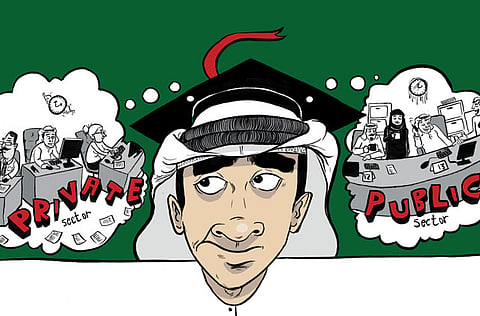The Emirati dilemma
Authorities call for awareness about private sector employment while students remain unconvinced

In the next ten years, more than 80,000 Emirati graduates will join the national workforce. However, there is a lack of awareness among Emirati youngsters regarding the importance of joining the private sector — especially as public sector jobs are dwindling.
"We face issues on a daily basis with Emiratis trying to convince them the private sector is important for the UAE economy," said Eisa Al Mulla, Executive director of National Workforce Development (NWD).
Under the NWD falls the Emirates National Development Programme (ENDP) whose objective is to integrate young Emiratis into the private sector.
The UAE unemployment rate stands at approximately 13 per cent, the majority being Emiratis.
"The only solution for any government to reduce unemployment rates is through the private sector," said Al Mulla.
With a little over one per cent of the Emirati population employed in the private sector, students admit there is a preference among their peers to work in the public sector.
Challenge
"Most of them do prefer to work in the public sector because everybody looks for luxury and the public sector pays good salaries. It also provides good packages with short working hours and everybody likes that," said Al Anoud Al Madhi, President of the Student Council at Abu Dhabi University.
"Some like the challenge of giving more and receiving less, but it depends on the priorities of the student," she added.
However, one element of the issue seems to lie with the fact Emirati students are not geared towards employment from the early stages of secondary school. Instead students at federal universities are introduced to employment through internships only during their last year at university.
"All students are obliged to complete an eight-week internship during their final year, which serves as their gateway to employment," said David Kelly, acting head of the careers office at Zayed University (ZU). "The internship helps highlight what work is all about for our students," he added.
But this does not seem to be enough. "What we are asking for is an introduction to work experience from the school level through apprenticeship programmes and internships — not beginning from the university level," said Al Mulla.
He said such programmes would serve to slowly shift the focus of Emirati youth to seek employment in the private sector, which primarily involves a change in their attitudes towards work.
"Students are exposed to their first job when they reach university level at the end of their fourth year and by then it is hard for them to adopt such ideas or change their attitudes," he added.
Kelly said although there are mixed views among students, the general consensus indicates a growing interest in private sector employment.
"The general trend is more of our students are confident about considering employment in the private sector. They are more confident to try it, which is reflected through their internships," he said.
"Some of my classmates work in the private sector but aren't given real work to do," said Nouf Al Hammadi, applied communications student at Dubai Women's College. "Maybe because employers have an image of Emiratis as not being able to do anything.
"One of my classmates works in a private company and she is the only local girl there, but they all give her trivial things to do because they think she is a spoilt Emirati who can't do anything," added Nouf.
She said it was up to the Emirati youth to disprove such stereotypes which exist in the private sector.
"We should worry about proving ourselves because there are many other nationalities working and we must prove that Emiratis can achieve as much as expats," she said.
Although Nouf regards such stereotypes as negative she sees a positive side.
"This image they have is good, because it will drive us to prove ourselves through self-development and prove to ourselves that we can do it, which in turn will boost our self-confidence and self-esteem," she added.
Yet other issues seeming to steer Emirati youth away from actively seeking employment in the private sector are culture shock and cultural restrictions.
"A student who's been educated in an environment which isn't co-ed would be more comfortable in a similar working environment," said Al Anoud.
However, those who do look to branch out may face cultural pressure. Aisha Abullah Bel Houl, an accounting and finance student from ZU, was recently offered a job with an international auditing firm. The job resulted from an internship but she recalls a fellow intern who struggled.
"She could never work in the private sector because all throughout the internship her brothers were against it. They didn't like her working in a mixed environment or working late hours," said Aisha.
She believes such apparent restrictions need debating. "These issues need awareness. The girls need to speak up, because even if public sector jobs are easier and more rewarding in the short-term, private sector jobs are better for the future. Although we can't do anything about the restrictions at the moment eventually they will have to loosen up," she said.
Another point which affects Emirati youth's job sector choice is their isolated cultural upbringing.
"Growing up, most Emirati men and women are surrounded by locals, therefore in employment they prefer being in similar surroundings, which they find in government employment," said Al Anoud.
She explained the majority of her peers regard joining the public sector as contributing to their nation, yet are seemingly unaware of the mammoth contribution of the private sector to the growth of the country's economy.
"Honestly, I don't blame students when they say they don't know about the importance of working in the private sector because we haven't encouraged them," said Al Mulla.
Sign up for the Daily Briefing
Get the latest news and updates straight to your inbox



